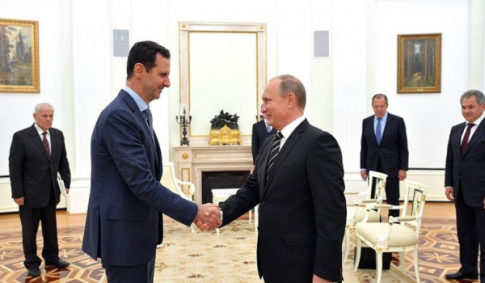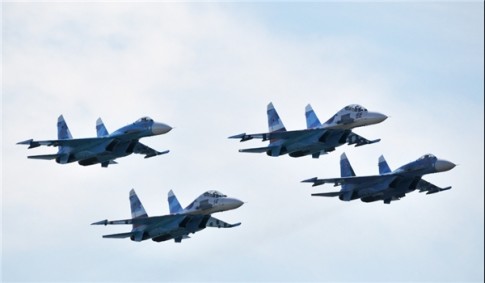Tomorrow, John Kerry will meet Sergei Lavrov and several of his other counterparts from Europe and the Mid-East in Munich in a last ditch effort to revive Syrian peace talks, which fell apart amid an intense Russian air assault on rebel positions in Aleppo.
For all intents and purposes, the rebels are surrounded. Initially, it appeared that the “moderate” opposition might be able to persist and bog down the Russians and the Iranians with the help of supplies from the US, Turkey, and Saudi Arabia. Those hopes faded over the past two weeks when Hezbollah advanced on Aleppo and ultimately encircled the city, cutting the rebels off from key supply lines and triggering a mass civilian exodus.
The talks in the Bavarian capital come at what is perhaps the most crucial point in the conflict to date. With the opposition on the ropes, it’s do or die time for Riyadh, Ankara, Doha, and the UAE. Either the Gulf monarchies send in ground troops to shore up the rebels or Hezbollah and the IRGC will overrun them in a matter of weeks – or perhaps even days.
Of course the opposition’s Sunni benefactors can’t exactly say they’re going into Syria to fight Iran and the Russians. Any ground incursion will be justified by the need to “fight ISIS” even though the Islamic State presence in Aleppo is markedly less pronounced than in other besieged urban centers like Raqqa and Deir ez-Zor. Indeed, the effort is so transparent that even the mainstream media has been forced to acknowledge it. Here’s FT, for instance:
Saudi Arabia is discussing plans to deploy ground troops with regional allies, including Turkey, for a safe zone in Syria, in a last-ditch effort to keep alive a rebellion at risk of collapse as a Russian-backed offensive by Syrian regime forces encroaches on the northern province of Aleppo.
Although western officials have dismissed the plans as lacking credibility, they are a sign of the desperation that many of Syria’s opposition backers feel towards what looks like an increasingly bleak outcome in the war. Two people familiar with Saudi plans told the Financial Times that high-ranking Gulf officials are in Riyadh meeting Turkish officials to discuss options for deploying ground troops to head a coalition of fighters inside Syria.
Aleppo city, Syria’s former business hub, is the last significant urban centre controlled by the rebels. Its countryside, on the northern border with Turkey, is their lifeline.
President Bashar al-Assad’s forces, bolstered by Iranian-funded Shia militias, advanced last week into opposition-held territory in Aleppo’s northern countryside under the cover of Russian air strikes. The violence prompted thousands of civilians to flee, exacerbating the already vast humanitarian crisis.
Publicly, Saudi Arabia, the UAE and Bahrain are calling for troops to be deployed as part of the US-led international coalition already ranged against Isis. This comes after Washington singled out Arab countries for not doing more to fight the Islamist group. But regional observers say the moves are cover for an intervention to help the Syrian rebels.
Of course the most absurd aspect of the “fight ISIS” narrative is that the force which is most effective at combatting Islamic State – the YPG- is under attack by Turkey. That would be the same Turkey who, like everyone else, is using ISIS to justify its intervention in Syria. “Are you our side or the side of the terrorist PYD and PKK organization?” President Recep Tayyip Erdogan asked, in a speech in Ankara to provincial officials on Wednesday. He went on to say the US has caused “a sea of blood” in Turkey by supporting the YPG in Syria. “Ankara summoned the U.S. ambassador to express its displeasure after State Department spokesman John Kirby said on Monday the United States did not regard the PYD as a terrorist organization,” Reuters notes.
As for the opposition in Aleppo, the rebels are literally begging the US to intervene. “I believe he can really stop these attacks by the Russians,” Spokesman Salim al-Muslat told Reuters, referring to President Obama. If he is willing to save our children it is really the time now to say ‘no’ to these strikes in Syria. I believe he can do it but it is really strange for us that we don’t hear this from him.”
Actually it’s not at all strange. John Kerry can’t simply “ask” Sergei Lavrov to stop the bombing in Aleppo. As he told aid workers in London over the weekend, the US can’t exactly “go to war with Russia,” which is what would be required to compel the Kremlin to halt airstrikes on rebel positions.
The French are also skeptical of America’s ability to halt the Russian and Iranian offensive. “There are the ambiguities including among the actors of the coalition … I’m not going to repeat what I’ve said before about the main pilot of the coalition,” French Foreign Minister Laurent Fabius said. “But we don’t have the feeling that there is a very strong commitment that is there.”
Again though, it’s not a matter of “commitment.” It’s a matter of whether or not the US wants to challenge Russia and Iran militarily because as should be abundantly clear by now, this has nothing at all to do with ISIS and everything to do with what’s about to happen at Aleppo. “It’s seen as the heart of what’s left of the rebel movement in terms of holding a major city without being infested by Islamic State,” Julian Barnes-Dacey, a senior policy fellow at the European Council on Foreign Relations told Bloomberg. “If Assad can get that, then it’s hard to imagine the opposition surviving.”
Precisely. Which was the plan from the beginning. It’s not that Russia and Iran don’t want to fight Islamic State. They do. But unlike Washington and its regional allies, Moscow has never pretended that the fight in Syria is strictly about ISIS. Rather, the conflict is about putting down an insurgency that threatens to plunge yet another Mid-East country into failed state status and it’s also about drawing a line in the sand when it comes to the West’s persistent meddling in the affairs of sovereign states. The most effective way to turn the tide and end the insurgency is to recapture the country’s urban centers first, and Aleppo is crucial to that plan. Once it’s secured, they’ll be a push east to liberate Raqqa and relegate ISIS to the annals of jihadist history.
We suppose the most important thing to understand here is this: Saudi Arabia, Turkey, and the UAE are mulling sending ground troops to fight the Russians and Iranians who are attempting to put an end to an insurgency that’s cost the lives of hundreds of thousands of Syrians. That campaign has most assuredly aggravated the violence in the short-term, but it’s an effort to restore a sense of normalcy to a country that’s seen nothing but chaos for nearly six years. Rather than let Moscow and Hezbollah finish the job, the US and its regional Sunni allies would rather send in ground troops to prop up the rebels. So please tell us: who are the bad guys and who are the good guys here?


https://www.superstation95.com/index.php/world/884
This is interesting. Yahoo finance graphs of the World’s Stockmarket, recently decided to not show how Italy was doing.
Nobody bothered to check. But I heard the Southern end of Italy will not take Euros anymore, but only hard currency and GBP!!!!!
This is why….
http://www.tradingeconomics.com/italy/stock-market
Seems Monsatan has been part of John Perkins’ Hitmen Group for decades…
http://www.earthisland.org/journal/index.php/eij/article/monsanto_and_the_mustard_seed/
And they’re still at it, destroying economies, cultures, health…who needs war when Monsatan’s about?
http://www.counterpunch.org/2016/02/11/indian-food-and-agriculture-under-attack/